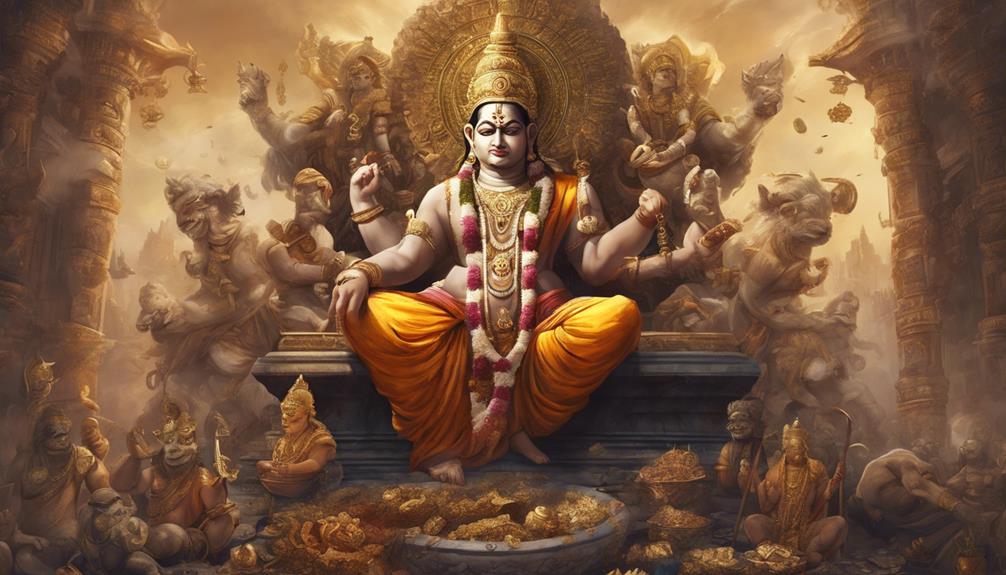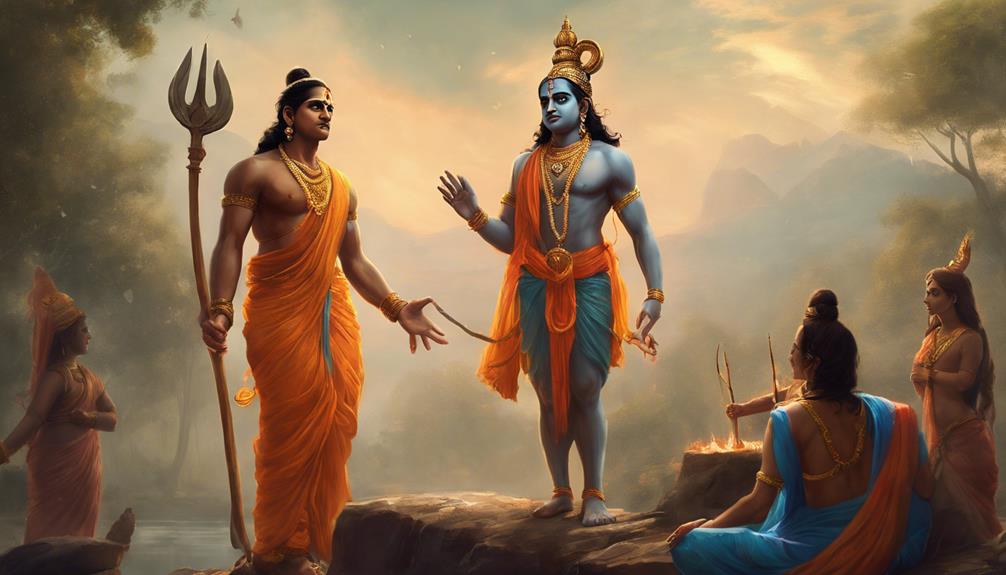Exploring Hindu mythology reveals moral and ethical lessons woven intricately into the tales of its gods. Through stories of righteousness, compassion, forgiveness, and the perils of greed and arrogance, you uncover profound insights. Themes of wisdom, humility, and sacrifice provide guidance for traversing life and society, offering a rich tapestry of virtues to contemplate the complexities of existence further.
Table of Contents
Key Takeaways
- Hindu gods exemplify righteousness, compassion, forgiveness, humility, and sacrifice in their stories.
- Stories emphasize fulfilling duties, showing compassion, forgiving others, acting with wisdom, and making sacrifices.
- Themes of duty, honor, integrity, and selflessness are central in the moral and ethical lessons.
- Lessons warn against greed, arrogance, and selfishness, highlighting the importance of humility and contentment.
- The narratives serve as guides for individuals to align with cosmic order, embody virtues, and prioritize the greater good.
The Virtue of Righteousness
In Hindu mythology, the concept of righteousness, known as 'Dharma,' serves as a guiding principle for moral conduct and ethical decision-making. Duty and honor are central themes within the framework of Dharma. It emphasizes the importance of fulfilling one's responsibilities and obligations towards society, family, and oneself. Upholding one's duty is considered virtuous and aligns individuals with the cosmic order.
Integrity and truthfulness are paramount in the practice of Dharma. Being truthful in thoughts, words, and actions is seen as essential for maintaining harmony and balance in the universe. Hindu gods often exemplify these qualities through their actions and teachings. Stories depict how adherence to integrity and truthfulness leads to positive outcomes, while deviation results in chaos and suffering.
Lessons in Compassion and Forgiveness
Compassion and forgiveness are fundamental values that Hindu mythology imparts through the actions and teachings of its deities, illustrating the significance of empathy and pardoning in moral and ethical development. In Hindu stories, deities like Lord Krishna and Lord Rama exemplify compassion through their interactions with various beings. Lord Rama, for instance, forgave Kaikeyi for exiling him and embraced her with understanding, showcasing the importance of forgiveness even in challenging circumstances. This act of empathy and redemption not only highlights Rama's virtuous character but also serves as a moral lesson for followers.
Similarly, the story of Lord Krishna and his compassion towards all beings, regardless of their nature, emphasizes the universal quality of empathy. His teachings in the Bhagavad Gita stress the importance of forgiveness as a means of inner peace and spiritual growth. By embodying these qualities, Hindu gods provide devotees with exemplars to emulate, encouraging them to cultivate compassion and forgiveness in their own lives for personal growth and societal harmony.
Consequences of Greed and Arrogance

Greed and arrogance in Hindu mythology often lead to dire consequences for those who succumb to these destructive traits, serving as cautionary tales for individuals seeking moral guidance.
One prominent example is the story of King Bali, known for his arrogance and desire for power. Despite being warned by his guru, Shukracharya, Bali's greed led him to challenge the gods and offer his entire kingdom in a grand sacrifice. This act of hubris ultimately resulted in his downfall when Lord Vishnu, disguised as a dwarf, tricked Bali into surrendering everything he had.
Similarly, the tale of Ravana from the epic Ramayana exemplifies the destructive nature of greed and arrogance. Ravana's insatiable desire for power and his arrogance in underestimating Lord Rama's strength led to the downfall of his kingdom, Lanka, and his eventual demise in battle.
These stories serve as powerful reminders of the consequences of greed and arrogance, urging individuals to cultivate humility and contentment to avoid similar fates.
Wisdom and Humility in Actions
Wisdom and humility manifest as guiding virtues in Hindu mythology, illustrating the transformative power of self-awareness and modesty in shaping moral conduct. One prominent example is the story of Lord Rama from the epic Ramayana, who exemplifies humility through his unwavering devotion to duty and righteousness. Despite being a powerful prince, Rama willingly accepts exile to fulfill his father's word, showcasing selflessness and humility in his actions. This act of sacrifice demonstrates Rama's wisdom in understanding the greater good and his humility in accepting his fate with grace.
Similarly, the tale of Lord Krishna in the Bhagavad Gita emphasizes the importance of wisdom and humility in actions. Krishna advises Arjuna on the battlefield, encouraging him to perform his duty selflessly and without attachment to the outcomes. By embodying humility and selflessness, Arjuna learns to act with wisdom and righteousness, understanding that true fulfillment comes from serving a higher purpose beyond personal desires. These stories from Hindu mythology teach valuable lessons on the significance of humility and selflessness in guiding ethical conduct and decision-making.
Sacrifice for the Greater Good

The theme of sacrifice for the greater good emerges prominently in Hindu mythology as a profound demonstration of selflessness and virtue, echoing the ethical lessons of humility and wisdom portrayed by the Hindu gods. Hindu scriptures are replete with tales of individuals who willingly put the needs of others above their own desires, showcasing the pinnacle of devotion and selflessness. One such example is Lord Rama's exile to the forest for fourteen years to honor his father's word, despite being the rightful heir to the throne. This act of sacrifice exemplifies the importance of duty and righteousness over personal gain, illustrating the noble qualities of selflessness and devotion in Hindu ethics.
Furthermore, the story of Goddess Sita's unwavering loyalty to Lord Rama during her captivity by the demon king Ravana highlights the transcendence of love and sacrifice for the greater good. Sita's steadfast devotion symbolizes the enduring power of selflessness in the face of adversity, inspiring followers to prioritize the welfare of others above their own interests. Through these narratives, Hindu mythology teaches profound moral and ethical lessons on the significance of sacrificing for the greater good, fostering a culture of compassion, altruism, and service to humanity.
Frequently Asked Questions
How Do the Stories of Hindu Gods Address the Concept of Free Will and Personal Responsibility?
In Hindu tales, the interplay between fate and individual choice is a recurring theme. Characters face decisions that impact their lives, highlighting lessons on accountability and consequences. These stories serve as mirrors to reflect upon personal responsibility.
What Role Do the Stories of Hindu Gods Play in Shaping Societal Norms and Values in Hindu Culture?
The stories of Hindu gods notably influence societal norms and cultural values, shaping moral teachings through religious narratives. These tales serve as a guide, imparting ethical lessons that impact behavior and beliefs within Hindu culture.
Are There Any Lesser-Known Stories of Hindu Gods That Offer Unique Moral and Ethical Lessons?
Explore the lesser-known tales of Hindu gods for hidden gems of wisdom. Unearth unexplored narratives offering unique moral insights. Discover overlooked teachings that enrich your understanding of ancient Hindu culture and its ethical lessons.
How Do the Stories of Hindu Gods Address the Complexities of Human Emotions Such as Jealousy, Anger, and Love?
When exploring emotional complexities in Hindu mythological narratives, you'll find divine teachings that offer guidance on traversing human emotions like jealousy, anger, and love. These stories provide valuable lessons for understanding and managing these feelings.
How Do the Stories of Hindu Gods Emphasize the Importance of Balance and Moderation in One's Actions and Beliefs?
To emphasize balance and moderation in actions and beliefs, Hindu gods' stories often highlight self-control and mindfulness. They showcase the importance of harmony and selflessness, guiding you towards a path of virtuous living.
Conclusion
To sum up, the stories of Hindu gods serve as valuable sources of moral and ethical lessons, teaching readers the importance of righteousness, compassion, humility, and sacrifice. Through these narratives, individuals are encouraged to reflect on their own actions and choices, ultimately guiding them towards a path of virtuous living.
By studying these ancient tales, one can gain insight into the complexities of human nature and the significance of upholding values that promote harmony and righteousness in society.